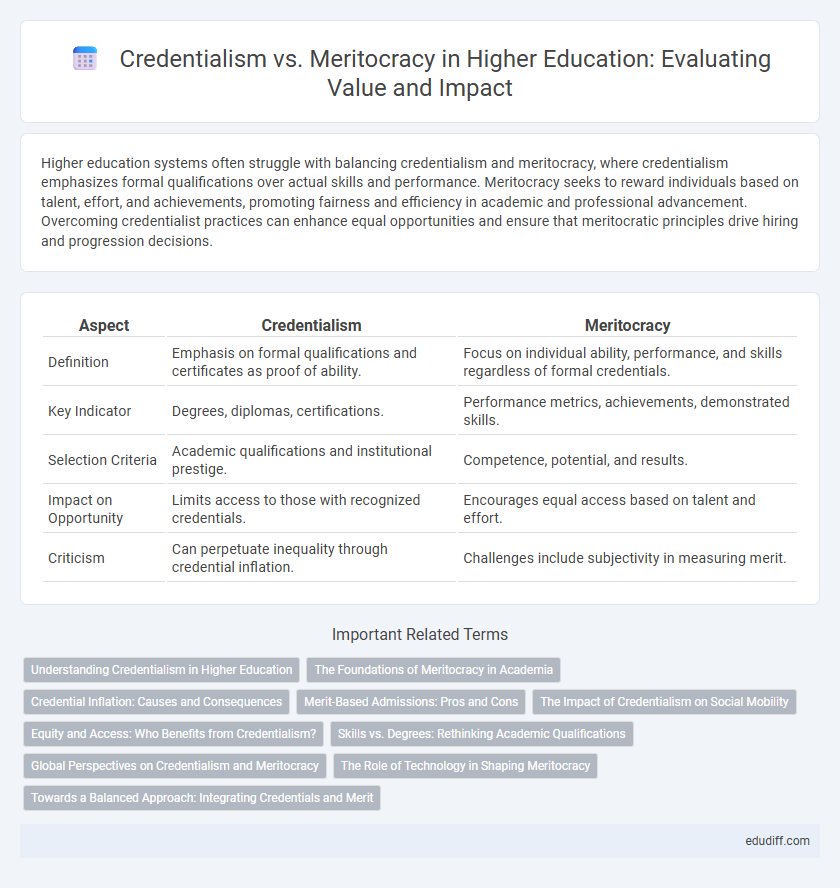Higher education systems often struggle with balancing credentialism and meritocracy, where credentialism emphasizes formal qualifications over actual skills and performance. Meritocracy seeks to reward individuals based on talent, effort, and achievements, promoting fairness and efficiency in academic and professional advancement. Overcoming credentialist practices can enhance equal opportunities and ensure that meritocratic principles drive hiring and progression decisions.
Table of Comparison
| Aspect | Credentialism | Meritocracy |
|---|---|---|
| Definition | Emphasis on formal qualifications and certificates as proof of ability. | Focus on individual ability, performance, and skills regardless of formal credentials. |
| Key Indicator | Degrees, diplomas, certifications. | Performance metrics, achievements, demonstrated skills. |
| Selection Criteria | Academic qualifications and institutional prestige. | Competence, potential, and results. |
| Impact on Opportunity | Limits access to those with recognized credentials. | Encourages equal access based on talent and effort. |
| Criticism | Can perpetuate inequality through credential inflation. | Challenges include subjectivity in measuring merit. |
Understanding Credentialism in Higher Education
Credentialism in higher education emphasizes the importance of formal degrees and certifications as proof of competence, often overshadowing actual skills and knowledge. This system prioritizes the accumulation of academic credentials over demonstrable merit, potentially limiting access for capable individuals lacking traditional qualifications. Understanding credentialism reveals how educational institutions and employers may favor credentials as social signals rather than purely assessing merit-based achievements.
The Foundations of Meritocracy in Academia
Meritocracy in academia is founded on the principle that individuals advance based on talent, effort, and measurable achievements rather than social status or connections. This system emphasizes rigorous evaluation criteria, such as peer-reviewed research, standardized testing, and academic performance, to ensure fairness and competence. The contrast with credentialism highlights concerns that formal qualifications alone do not always reflect true ability or potential in scholarly environments.
Credential Inflation: Causes and Consequences
Credential inflation arises from the widespread emphasis on academic degrees as primary indicators of job qualification, leading employers to raise entry requirements unnecessarily. This phenomenon causes an oversupply of degree holders for limited job opportunities, resulting in underemployment and devaluation of educational credentials. The consequences include increased socioeconomic inequality as individuals invest more in education without proportional returns in employment or wages.
Merit-Based Admissions: Pros and Cons
Merit-based admissions prioritize academic achievements, standardized test scores, and extracurricular accomplishments to select candidates, promoting a culture of excellence and incentivizing student effort. However, this approach may disadvantage students from underprivileged backgrounds who lack access to quality resources, perpetuating socioeconomic inequalities in higher education. Critics argue that meritocracy overlooks diverse talents and contextual factors, suggesting the need for more holistic admission criteria.
The Impact of Credentialism on Social Mobility
Credentialism significantly restricts social mobility by prioritizing formal qualifications over actual skills and talents, often marginalizing capable individuals from lower socioeconomic backgrounds who cannot access expensive education. This emphasis on certificates and degrees reinforces existing social inequalities, as access to elite institutions remains unevenly distributed. Consequently, meritocracy is undermined when credentialism becomes the primary gatekeeper in higher education and employment opportunities.
Equity and Access: Who Benefits from Credentialism?
Credentialism perpetuates inequities in higher education access by privileging individuals with resources to obtain formal qualifications, often marginalizing underrepresented groups. Meritocracy, ideally based on individual ability and effort, can be compromised when credentials overshadow actual skills, limiting true equitable opportunity. Addressing this disparity requires reevaluating credential emphasis to create a more inclusive system that genuinely rewards competence and potential.
Skills vs. Degrees: Rethinking Academic Qualifications
Skills acquisition increasingly outperforms traditional degree credentials in signaling job readiness and professional competence. Employers emphasize demonstrable skills and practical experience over formal academic qualifications, challenging credentialism's dominance. This shift promotes a meritocratic approach where capabilities drive opportunities rather than symbolic degrees.
Global Perspectives on Credentialism and Meritocracy
Credentialism dominates global higher education systems by emphasizing formal qualifications as key indicators of competence, often perpetuating social inequalities in access and opportunity. Meritocracy, while idealized as a fair measure of ability and effort, varies significantly across cultures and economies, with some nations prioritizing standardized testing and others valuing holistic assessments. Cross-national studies reveal that countries with strong credentialist frameworks tend to have less social mobility, whereas those promoting meritocratic principles show greater inclusivity but face challenges in ensuring objective evaluation standards.
The Role of Technology in Shaping Meritocracy
Technology has revolutionized educational assessment by enabling data-driven evaluations that prioritize measurable skills over traditional credentials, fostering a more meritocratic system. Adaptive learning platforms utilize algorithms to tailor instruction to individual abilities, ensuring that merit is accurately recognized and rewarded. Digital credentialing and blockchain verification further reduce credential inflation, supporting a merit-based approach in higher education and the workforce.
Towards a Balanced Approach: Integrating Credentials and Merit
Integrating credentials and merit in higher education promotes a balanced approach that values both formal qualifications and individual achievements. Emphasizing skills alongside diplomas enhances workforce competence and ensures equitable access to opportunities. This synergy supports holistic assessment methods, driving improved academic and professional outcomes.
Credentialism vs Meritocracy Infographic

 edudiff.com
edudiff.com